
|
January 18, 2011 - No. 2 Vietnamese People Celebrate Communist Party's National Congress Long Live the Communist Party of Vietnam!
|
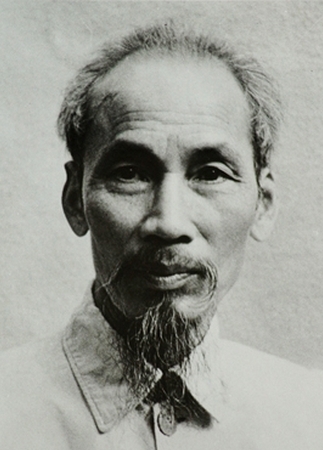 Comrade Ho Chi Minh, legendary leader of the Communist Party of Vietnam and the Vietnamese people. |
The Party Congress is convened every five years. The CPV was founded on February 3, 1930, consistent with the needs of the time especially the people's struggle for national liberation, independence and nation-building. Nearly 81 years later, the CPV continues its historic role to ensure the well-being of the people and nation as the leading force in society. The CPV points out that "With great efforts, Vietnam recovered from the domestic socio-economic crisis in 1996, the regional monetary crisis during the 1997-2000 period, and the global economic depression in 2007-2009. Over the past five years, Vietnam has overcome numerous difficulties and challenges to stabilize the macro-economy, control the inflation rate and maintain a high growth rate." The 11th National Congress is summing up these achievements and setting a program for further accomplishments.
On the occasion of the 11th National Congress of the CPV, leader of the Communist Party of Canada (Marxist-Leninist) Sandra L. Smith sent a letter of greetings to the CPV saluting the historic accomplishments of the Party and the heroic Vietnamese people. It stated in part:
"Words cannot express the esteem and admiration your Communist Party holds in our thoughts, memory and hearts. The deeds and achievements of the Vietnamese people led by your Communist Party and its legendary leader Comrade Ho Chi Minh resonate throughout the world. Not only have you been able to defeat the most powerful military machines of the French, Japanese and U.S. imperialist invaders, you have embarked on an inspiring march to transform your country guided by Marxism-Leninism and Ho Chi Minh Thought. We are truly inspired by your achievements in making Vietnam a developed prosperous nation with a modern socialized industrial economy, where the rights of the working class and other toiling people are guaranteed within your Constitution.
"In sending our best wishes for success in your Congress deliberations, CPC(M-L) also expresses its confidence that the Congress agenda will further strengthen the capacity of the Vietnamese people to build a bright future for themselves and contribute to the same internationally as is their ardent wish consistent with the striving of all of humankind.
"We too are working hard to build the leadership capacity of our Party to provide the working class with the direction it requires to constitute itself the nation and vest sovereignty in the people and make Canada a factor for peace in the world. Please be assured that our Party will do everything in its power to support your nation-building process in any way it can."
Eleventh National Congress of
Communist Party of Vietnam
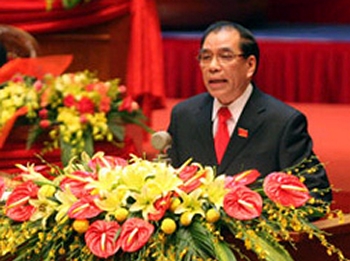 Party General Secretary Nong Duc Manh addresses the Congress. |
The Communist Party of Vietnam (CPV) is holding its 11th National Congress in Hanoi from January 12 to 19. The Congress is convened every five years.
The Congress, with the participation of 1,377 delegates representing over 3.6 million Party members in the country, is being held under the theme of continuing to enhance the Party's leadership capacity and combativeness, promoting national synergy, comprehensively boosting the renewal process and creating the foundation for Vietnam to become a modern industrial country by 2020. The renewal process, launched at the Party's 6th National Congress in 1986, is aimed at abolishing the mechanism of bureaucratic centralism with State subsidies, restructuring the economy and the management mechanism, building a multi-sector and socialist-oriented market economy, promoting global integration and expanding cooperation with other countries.
Deliberations at the 11th National Congress are focused on four major draft documents submitted to the Congress: the Platform on National Construction in the Transitional Period toward Socialism (supplemented and developed in 2011), the Socio-Economic Development Strategy for the 2011-2020 period, the Political Report; a report on amendments and supplements to the Party Congress and the draft Party Congress (supplemented and revised) and a report reviewing the leadership and guidance of the 10th Party Central Committee.
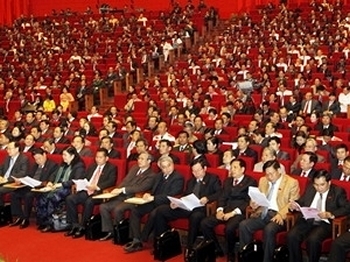 Delegates are discussing
the overall evaluation of the
Vietnamese revolutionary process; the targets and fundamental
directions in the process of socialist construction and defence; and
orientations for the development of the economy, culture, education and
training, national defence and security. This includes assessing
the achievements, shortcomings, weaknesses, reasons and lessons drawn
from implementation of the 2001-2010 Socio-economic Development
Strategy and the results of the 10th National Party Congress's
Resolution.
Delegates are discussing
the overall evaluation of the
Vietnamese revolutionary process; the targets and fundamental
directions in the process of socialist construction and defence; and
orientations for the development of the economy, culture, education and
training, national defence and security. This includes assessing
the achievements, shortcomings, weaknesses, reasons and lessons drawn
from implementation of the 2001-2010 Socio-economic Development
Strategy and the results of the 10th National Party Congress's
Resolution.
The delegates are also deliberating on solutions to develop and reform education and training; directions for Party building in terms of ideological training, virtue, ethics, improving Party members' quality, strengthening grassroots Party organizations, personnel planning of leaders and managers at all levels and increasing Party membership.
Contributing suggestions to the national defence and security contents, delegates affirmed that strengthening national defence and security constitute a very important and regular task of the Party, State and the entire people, with the army and police being key forces.
Delegates are expressing confidence in
the developments on various
fronts such as culture, education-training, science-technology,
environmental protection, social progress and equality. Delegates
affirm that developing and improving the quality of human resources,
especially high-quality personnel, is one of
the key factors for the country's rapid and sustainable development.
Preparations for the
Congress
Prior to the Congress, systematic preparations were made to ensure both the smooth functioning of the proceedings and also the greatest possible involvement of the people. On January 11, the preparatory session for the Congress took place. Under the chairmanship of comrade Nguyen Minh Triet, Politburo member and State President, the session adopted the working program of the Congress. Delegates voted in favour of the working regulations during the Congress presented by comrade Ho Duc Viet, head of the Party Central Committee Commission for Organization. A 24-member presidium and a 5-member secretarial team for the 11th National Party Congress were also elected.
To prepare the people to set the Congress' agenda and participate in the proceedings, the CPV made great efforts to instruct Party committees at all levels throughout the country, bringing the draft documents to the public, both domestic and overseas, for comments and working diligently to provide input for the draft Congress documents.
With respect to this agenda, the CPV's Central Committee Theory Council Head, To Huy Rua, highlighted on January 8 the recent theoretical contributions to the compilation of the Congress documents as a foundation for the Party leadership and State management.
Rua noted that the draft political report to the Congress calls for stronger theoretical research in combination with further drawing on real life to clarify issues facing the Party and the implementation of its program. He also said the report urged further research on issues emerging from the renewal process to help work out sound policies and guidelines in service of national development.
The CPV reports that the program of research in
political theory during the 2006-10 period has met its target with all
32 research projects winning State recognition. These projects
focused on practical elements of the Party's political program, the
current global situation and the trends in the years to come, the Party
and State's foreign policy and the creative
application of Marxism-Leninism and Ho Chi Minh thought on
socialism and international integration.
The research also investigated all aspects of the
current trend towards market economies and global integration from the
perspective of Vietnam's firm stands towards socialism and the defence
of
its cultural identity. Social democracy and progress as well as the
promotion
of democracy in the Party and society,
national unity and Party renovation and strengthening were also major
topics of research.
Rua noted that the next research program into political theory should be closely based on the 11th Party Congress documents, especially the political platform (supplements), the 2011-20 socio-economic development strategy and the political report.
Throughout the country, in the days leading up to the 11th National Congress of the CPV, many activities were held to celebrate the Party's historic achievements, including bookfairs, exhibitions and the inauguration of major construction projects.
Communist Party of Vietnam --
Glorious History and Sustainable Development
In early 2011, the Communist Party of Vietnam (CPV) is holding its 11th Congress to review 25 years of the renewal process, supplement and develop the Party's 1991 political program, and build a socio-economic development strategy for the 2011-2020 period in an effort to become a modern industrial country by 2020.
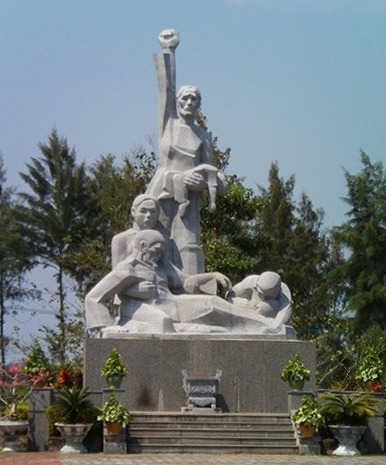 Memorial to the courageous Vietnamese resistance at the site of the infamous My Lai massacre by U.S. forces. |
In the early stages of the 20th century, when the
country was still under the domination of foreign colonialists and
imperialists, people lived their lives in poverty and hardship. On June
5, 1911, teacher Nguyen Tat Thanh (later Ho Chi Minh) left Vietnam to
find a path for national salvation. In 1930, he founded
the Communist Party of Vietnam, the vanguard of Vietnam's working class.
President Ho Chi Minh and the CPV led the Vietnamese revolution to great victories against the colonial and semi-feudal system to open a new era of independence and socialism and against neo-colonialism to regain unification. Under the leadership of the Party, Vietnam also had initial success in its renewal process which was launched at the Party's 6th National Congress in 1986. The renewal process is aimed at abolishing the mechanism of bureaucratic centralism with State subsidies, restructuring the economy and the management mechanism, building a multi-sector and socialist-oriented market economy, promoting the global integration, and expanding cooperation with other countries.
With great effort, Vietnam recovered from the domestic
socio-economic crisis in 1996, the regional monetary crisis during the
1997-2000 period, and the global economic depression in 2007-2009. Over
the past five years, Vietnam has overcome numerous difficulties and
challenges to stabilize the macro-economy,
control the inflation rate, maintain a high growth rate, and escaped
its underdevelopment.
The nation's GDP is estimated at U.S.$106 billion, a 100 per cent increase compared to 2005, with per capita income reaching about U.S.$1,200. Vietnam went from a poor and starving country to become the world's second biggest rice exporter with 6.88 million tons of rice exported in 2010. The process of modernization and industrialization has helped Vietnam upgrade its infrastructure. 250 industrial zones and various key economic regions are making Vietnam a modern industrial country.
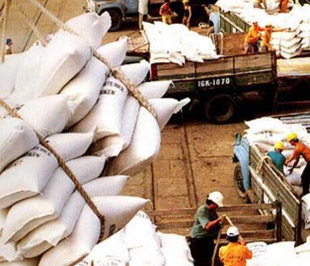 In 2010, Vietnam was the world's largest exporter of black pepper and cashews and the second biggest rice exporter. |
Economic development is not only the basis and condition for the achievements in social progress and equality but also helps resolve social issues and improve people's living conditions. In addition, Vietnam always attaches great importance to developing education and training, as well as science and technology.
At the United Nations Summit in 2010, to review the implementation of its Millennial Development Goals (MDGs), Vietnam was considered one of the most successful countries which will be able to achieve all of the goals by 2015.
Regarding elimination of hunger and alleviation of
poverty, Vietnam has been very successful with various socio-economic
development strategies and practical measures such as the Government's
Decision 135 to help poor communes upgrade their infrastructure and
Decision 134 to assist poor people with arable
land, houses and clean water. As a result, the poverty rate fell from
58 per cent in 1993 to 9 per cent in 2010.
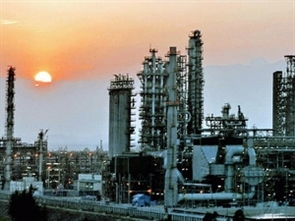
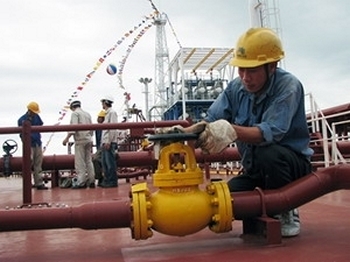
Left: On January 6, Vietnam's Prime Minister Nguyen Tan Dung officially inaugurated the country’s first oil refinery,
the Dung Quat facility. The refinery lays the foundation for the development of Vietnam’s petrochemical industry
and its overall industrialization and modernization. With more than 1,000 technicians, the facility can meet
30 per cent of the country’s needs for petroleum products. The Vietnam National Oil and Gas Group
(PetroVietnam) and its foreign partners are studying a possibility to raise the refinery’s yearly capacity to
10 million tons. Oil and gas services set a record of VND152.5 trillion in revenues in 2010, representing a
year-on-year increase of 58 per cent and accounting for 32 per cent of PetroVietnam’s total turnover.
The Party also focused on dealing with issues relating
to agriculture and farmers by setting up a national target programme to
create new rural areas in which employment, population, healthcare
service, the "Paying debts of gratitude" movement [the national
program to ensure the well-being of war invalids
and the children of war invalids and martyrs from the Vietnam War --
TML Ed. Note], epidemic prevention, environmental protection, and
social welfare received much attention.
Since the renewal process was launched, the Party has
ceaselessly tried its best to improve its political argument, reform
the organizational and personnel work, learn and follow President Ho
Chi Minh's moral example, strengthen the struggle against corruption
and bureaucracy, improve the effectiveness of State
management, ensure political, defense and security stability, and
reinforce the national unity bloc.
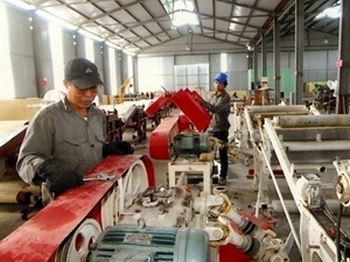
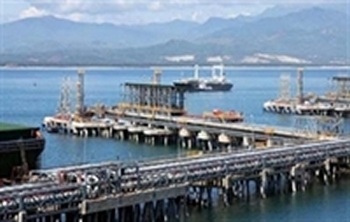
Since Vietnam began implementing the renewal process, policies encouraging investment in Vietnam have
made great contributions to attracting foreign direct investment. The Dung Quat economic zone (right) attracted
113 investment projects with a total registered capital of U.S.$8 billion, providing jobs for more than 12,000
workers and contributing more than VND13 trillion to the State budget in 2010.
2010 was considered a successful year for Vietnam with a variety of major events being celebrated. The country fulfilled its mission as Association of Southeast Asian Nations' (ASEAN) Chair with the organization of the 16th and 17th ASEAN Summits, which were attended by not only ASEAN members but also important partners such as Russia and the U.S.
In 2009, Vietnam also fulfilled its mission as a non-permanent member of the UN Security Council. Joining the World Trade Organization in 2007, Vietnam is now a trustworthy friend and partner of all countries and the international community.
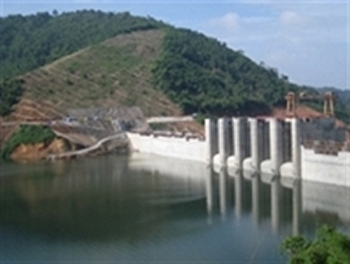 Dong Nai 3 Hydroelectric Power Plant’s first turbine was officially put into operation on January 8 in Dac Giong district, Dak Nong province, in the presence of Deputy Prime Minister Hoang Trung Hai. It was one of the activities to celebrate the 11th National Party Congress. |
Communist Vietnamese people are proud of their great achievements. However, there are still shortcomings, such as the unsustainable development, the weaknesses in education and training, science and technology, culture and society, and environmental protection. Bureaucracy and corruption have not been completely eliminated and there remain shortcomings in the building of the Party.
A ruling Party should never be satisfied with what it has achieved. It should admit its shortcomings and make great efforts to improve itself for the development of the nation and for the benefit of the people. The eighth session of the 12th National Assembly took place with a high sense of responsibility in an ebullient and democratic atmosphere. The Party, the Government, the National Assembly and the whole population of Vietnam will join hands to discuss and decide the nation's issues to motivate sustainable development.
50th Anniversary of Vietnamese National Liberation Front Celebrated in Ho Chi Minh City
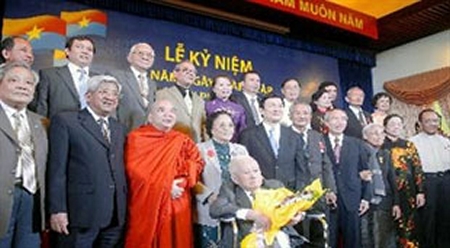 The 50th anniversary of the
National Liberation Front
(NLF) of South Vietnam was celebrated in Ho Chi Minh City on December
20 by the Vietnam Fatherland Front (VFF)'s Central Committee and the
city's administration.
The 50th anniversary of the
National Liberation Front
(NLF) of South Vietnam was celebrated in Ho Chi Minh City on December
20 by the Vietnam Fatherland Front (VFF)'s Central Committee and the
city's administration.
Also known as the Vietcong, the NLF was an organization and military force established by Vietnamese communists in the south in 1960 as a broad front to oppose the U.S. and its puppet south Vietnamese government.
The celebration was attended by politburo member and member of the Communist Party of Vietnam (CPV) Central Committee's Secretariat Truong Tan Sang, former Prime Minister Phan Van Khai, CPV Secretary and Head of the Party Central Committee's Commission for Mass Mobilization Ha Thi Khiet and President of the VFF's Central Committee Huynh Dam, along with other Party and State leaders.
In his speech, Dam recalled the establishment of the
NLF, which marked a turning point in the southern revolution and was an
indispensable part of the history and creativity of the Party and
President Ho Chi Minh.
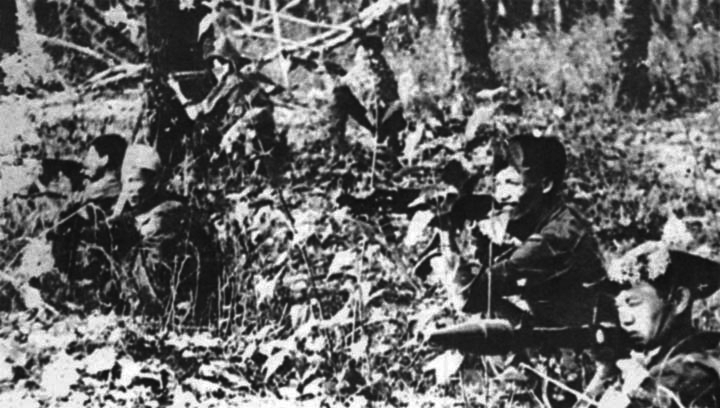

National Liberation Front units during the Vietnam War.
During the 15-year period from the NLF's establishment to the 1975 Great Spring Victory, Vietnamese soldiers and people liberated all of south Vietnam for national unification, glorifying the national history, in which the NLF played a very important role.
The Vietnamese Party and State always praise the NLF's significant contributions to national liberation, Sang said.
He asked the VFF to uphold the NLF's glorious tradition by diversifying activities, promoting patriotic movements and encouraging all Vietnamese people to make more contributions to the cause of national construction and defence.
On the occasion, the Party and State presented the Order of Great Unity to 70 NLF former leaders and members of the Advisory Council of the provisional Revolutionary Government of the Republic of South Vietnam and the Alliance of National, Democratic and Peace Forces in recognition of their contributions to building the great national unity bloc, socialism and national defense.
(Voice of Vietnam)
Read The Marxist-Leninist
Daily
Website: www.cpcml.ca
Email: editor@cpcml.ca

